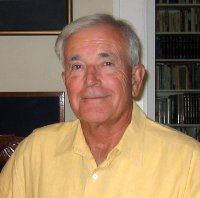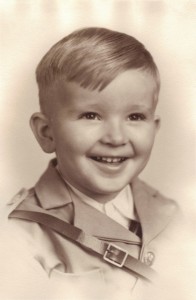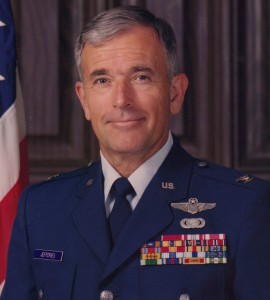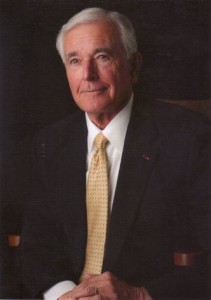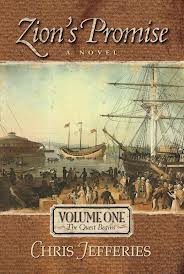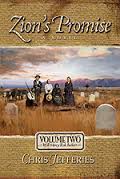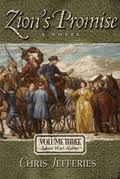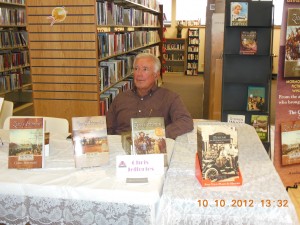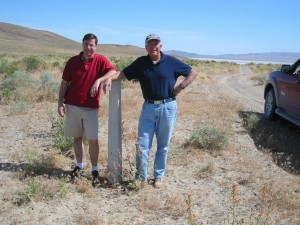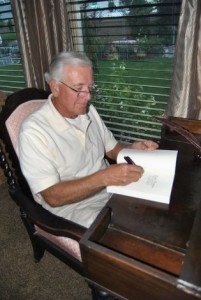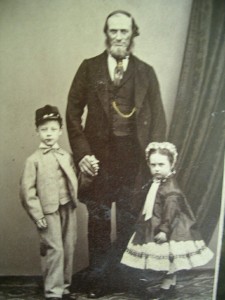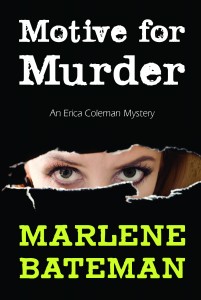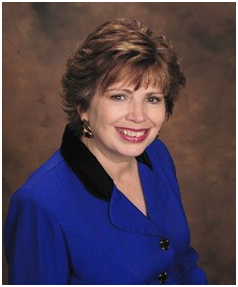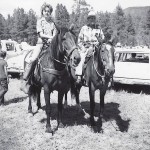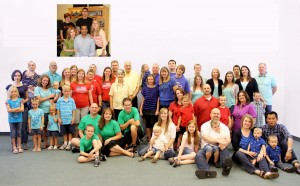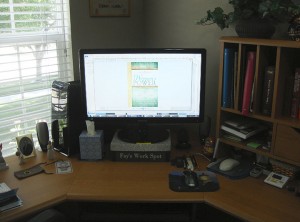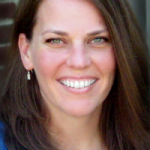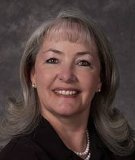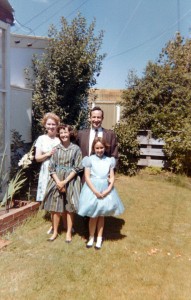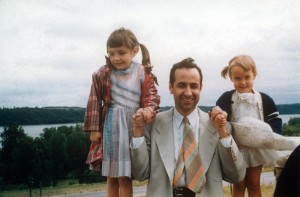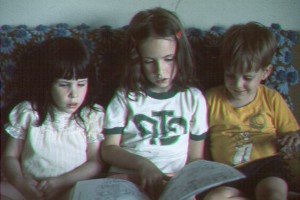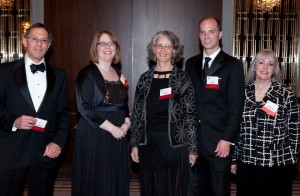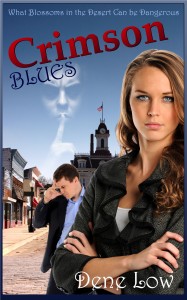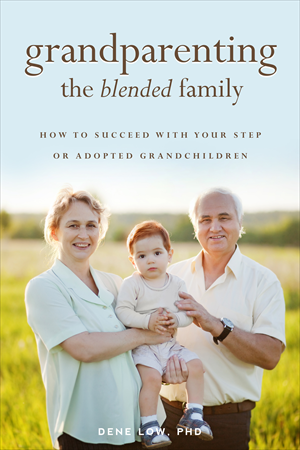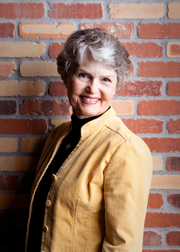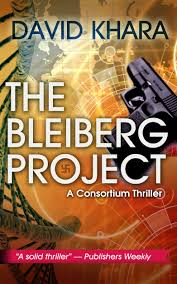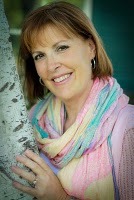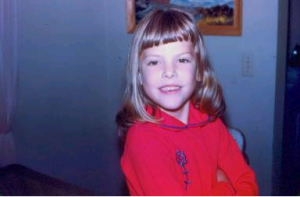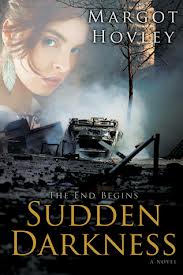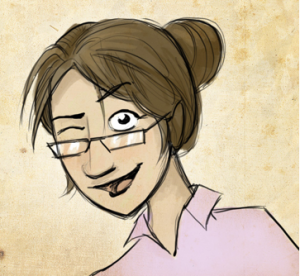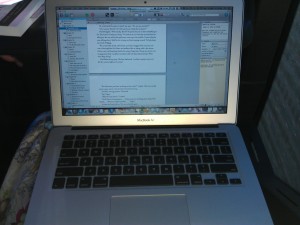Are you comfortable? Do you have a ready supply of chocolate (or your favorite snack if it’s not chocolate)? Then settle yourself in for a long, detailed interview with Rebecca Belliston, an author of YA Romance and dystopian fiction, and a composer of religious and classical-styled music.
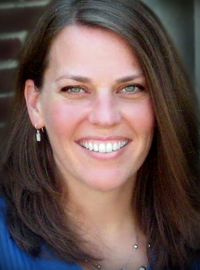 ME: I didn’t realize (until I was preparing for this interview) that you’re the daughter of Gerald Lund, one of the most respected and well-known authors in LDS circles, thanks mostly to his series, The Work and the Glory. Those are some pretty big shoes to fill, or do you not even worry about it? How have you dealt with his fame when it comes to your own writing career? (And I’d love a picture of you with your father when you were a child.)
ME: I didn’t realize (until I was preparing for this interview) that you’re the daughter of Gerald Lund, one of the most respected and well-known authors in LDS circles, thanks mostly to his series, The Work and the Glory. Those are some pretty big shoes to fill, or do you not even worry about it? How have you dealt with his fame when it comes to your own writing career? (And I’d love a picture of you with your father when you were a child.)
REBECCA: Growing up, I had a lot of people ask me, “Are you a writer like your dad?” I’d quickly respond that I wasn’t. Not at all. I loved watching him write, reading his books, and talking about his characters over dinner and whether Joshua Steed should ever turn good. But writing was always his thing.
Until five years ago.
I had this story stuck in my head for a year, and I decided to jot down a few notes so I could hopefully stop thinking about it. (Uh-oh. That sounds familiar.) But once I started writing . . . oh boy, I couldn’t stop. (Addictive, isn’t it?) I fell in love with the process of creating, refining, and molding characters, and then trying to figure out what might happen next. And then next.
Since I never planned to write, and since I grew up being “Gerald Lund’s daughter,” I had an unreasonably hard time admitting what I was doing. It took me two weeks to tell my husband. Pathetic, right? (But kind of understandable, too.) When he didn’t disown me or laugh me out of town, I told my dad.
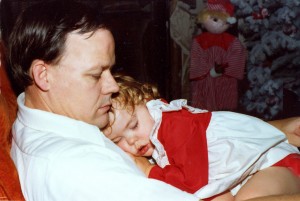 (Gerald Lund with Rebecca…and, unseen in the frame, a keyboard. Just kidding!)
(Gerald Lund with Rebecca…and, unseen in the frame, a keyboard. Just kidding!)
My dad’s been so supportive and excited for me right from the start. I’m smiling right now just thinking about his enthusiasm. It’s been a blast to talk writing jargon with him and to watch a pro like him work through the creative process. I’ve learned so, so, so much.
But to answer your question, yes. Those are huge writing shoes to fill. Ginormous. When I found out SADIE was being published, I kind of freaked out, wondering if people would compare my book with my dad’s and expect some amazing doctrinal dissertation that would change their life.
(That does sound like a major freak out.)
You might notice that “Lund” is not in my official author name on my book covers. That was for a few reasons. Rebecca Belliston is a long enough name to fit on a cover without inserting “Lund” in there. But I also wanted to protect my dad, myself, and my readers. If people disliked my books, I didn’t want them to think less of my dad. I also didn’t want any readers to pick up my book and think they were getting a Gerald Lund-type book. I write romances.
However, one thing I inherited from my dad is the ability to write long books and long answers. (:D) Sorry. That was probably more detail than you wanted. :D
(Not at all. I love details.)
ME: Or perhaps it’s your mother, Lynn, with all of her composing, who has been most influential creatively? (Again, I’d love a picture of you as a child with her.)
REBECCA: While I never grew up thinking I’d follow my dad’s footsteps, I definitely followed my mom’s, even from a young age. My mom has written hundreds of songs and taught piano since before I was born. I’m told that, as a baby, I’d sit quietly on her lap during all her piano lessons. (I can think of a few piano-teaching moms who are probably envious right now.) I’ve loved music as long as I can remember.
By three years old, I was sounding out songs on the piano. (Piano lessons by osmosis, right?) By four, I was taking piano lessons. By six, I had perfect pitch, and I was writing my own songs about purple unicorns and rainbows.
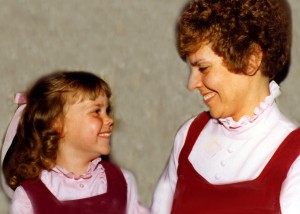 (Rebecca with her mom)
(Rebecca with her mom)
My mom has been a huge creative influence in my life, and I love her dearly for it. She would encourage me to think about melodies and what made them unique and beautiful. Then she’d point out accompaniments that would counter the melody instead of following it.
Like my dad, my mom has been a huge support of my compositions, cheering me on in the tiniest achievements. When my first choral arrangement was published with Jackman Music, I could practically hear her screaming across the country.
As you can see, I have the best parents. I was raised in an attitude of, If you can dream it, do it! Don’t let doubt get in your way. (Great motto for all creative types, particularly writers.) I watched them get these crazy ideas that no one ever tried, but they’d just run with it and turn it into something inspiring. Fear of failure was either non-existent or unseen.
Whenever I’ve exhibited the least bit of interest in the creative process, they’ve been on the sidelines cheering me on and telling me I’m the best in the world. Ha ha. I love them!
Everything I’m doing today with books and music I owe to my parents. Seriously.
(I hope you’ll share this interview with them so they realize how grateful you are.)
ME: What was your major in college and why? Were you able to finish a degree before your husband, Troy, swept you off your feet? (And please share a wedding photo of the two of you.) If not, do you plan on completing it at some time in the future?
REBECCA: I took a lot of music classes in college, but I technically didn’t major in music. I wasn’t really majoring in anything. I took computer classes, medical classes, science classes, and a bunch of other stuff, but I loved too many things to narrow it down to one subject. (At least not by the time you met Troy, I take it.)
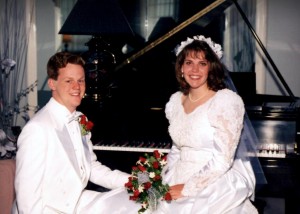 (Troy and Rebecca, appropriately by the piano)
(Troy and Rebecca, appropriately by the piano)
Once our oldest kid was born, I knew I wanted to be at home with him all the time. I never finished my degree. I wasn’t even close. But I’ve never regretted that decision. Not once.
As of now, I don’t have plans to finish my degree because, again, I’m not sure how I’d narrow it down to one subject. I’d love to major in six things. Maybe some day I’ll find the time to do all of it.
(That’s me. I wanted to be an archaeologist, historian, actress, playwright, filmmaker, foreign correspondent, etc. That’s the great thing about being a writer. We can satisfy so many different interests in our writing.)
Instead, I’ve used Google as my university. I’m a learning addict (Here, here!), and usually it’s random, useless things that catch my interest. But I love that I can have a simple question, and .30 seconds later I get 4.2 million answers. Thank goodness for Google!
(Agreed.)
ME: My sister and her husband lived in Detroit for a couple of years early on in their marriage and really didn’t like it, but that was almost 30 years ago. How has your family liked Detroit, and has that setting influenced your writing in any way?
REBECCA: I was born and raised in Utah, but once my husband graduated from Utah State, we moved to Michigan. We’ve lived here sixteen years now. He’s an automotive engineer and currently works on the Ford F-150, so Metro Detroit is the place to be.
 (2013 Ford F-150…looking nice, Troy!)
(2013 Ford F-150…looking nice, Troy!)
We live outside of the city 45 minutes, and we love it! Michigan is so gorgeous and green. Where we live has a strong Midwest feel. The people are so warm and open. The area is family friendly and strongly Christian, which is awesome for my kids.
(Now, if you’d asked me if I like Michigan in the dead of winter, I’d probably have a different answer.)
(It’s a good thing I interviewed you in summertime!)
Living outside of Utah and watching LDS people outside of Mormonville made me want to keep Sadie’s story outside of that little bubble. I wanted to show how LDS twenty-somethings maintain their standards when they’re in the minority. Because of that, most of the characters in SADIE and AUGUSTINA aren’t LDS. I like it that way. That’s my kids’ lives right now. There are so many good, Christian people in the world, and I have many close friends that aren’t of my faith. I guess I wanted to highlight that.
(I know what you mean. I always try to have a mix of faiths in my stories, too.)
ME: What gave you the idea to put lyrics into your manuscript for SADIE, and do you do it again in the sequel? Also, has the song “Look Past” been recorded anywhere?
REBECCA: I’m not sure where I got the idea for “Look Past.” It’s my first real attempt at writing lyrics. I wish it was recorded! That would be so cool! In my mind–and I probably shouldn’t admit this publicly (That’s okay…we don’t mind.)–but David Archuleta sings it. So . . . anyone know how to get Archie to record my song for me? :D (Even if we did, I think you’ll have to wait until he’s finished his mission first.)
(The more you get to know me, the more you’ll see what a dreamer I am. That’s the downside of my parents’ influence. My husband has a hard time keeping my feet on the floor. I have a bucket list a mile long, which involves Hollywood movies, Billboard-chart songs, and a lot of other stuff I’ll force myself to quit admitting.)
(Hey, don’t forget what your parents taught you. There’s nothing wrong with dreaming.)
I’m currently working on a song for AUGUSTINA, but it’s a hymn arrangement, not an original composition like “Look Past.” We’ll see if I can finish it before the release. Here’s hoping.
ME: Tell us about your successful first novel, SADIE, as well as its sequel, AUGUSTINA, due to come out shortly. How are they alike, and what differences might your readers expect in this sequel?
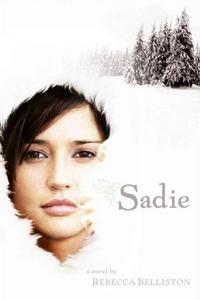 REBECCA: My first novel, SADIE, is about a girl in Montana who’s dating a guy with all the appearance of being wonderful and charming. Everyone loves Guillermo. But Sadie’s in the wrong place at the wrong time, and he turns violent. She goes on the run and meets four quirky guys on their annual ski vacation. They take her in, hide her, and show her a different way of living that doesn’t revolve around diamonds and dinner parties.
REBECCA: My first novel, SADIE, is about a girl in Montana who’s dating a guy with all the appearance of being wonderful and charming. Everyone loves Guillermo. But Sadie’s in the wrong place at the wrong time, and he turns violent. She goes on the run and meets four quirky guys on their annual ski vacation. They take her in, hide her, and show her a different way of living that doesn’t revolve around diamonds and dinner parties.
One of the guys, Josh, catches her interest with stupid jokes and amazing piano abilities. (My love of music shines strong in the books.) But Guillermo is cunning and powerful enough to draw Sadie back in. Before she knows it, she’s in the middle of a dangerous duel between him and the FBI, and it turns deadly. She has to figure out which side she’s on and which man she loves before it’s too late.
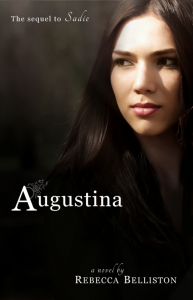
(Slight spoiler alert ahead for those who haven’t read SADIE yet . . . even if it is by the author, herself.)
In the sequel, AUGUSTINA, Sadie is on the run. Guillermo is furious she turned against him, and her body still shows the effects of his rage. Forced to leave Montana behind, she and Josh head south where she hopes to conquer her past–even if only in her mind. But Guillermo can’t let go. He’s still orchestrating, hunting, and devising ways to exact his own kind of justice. When the law swings in his favor, he’s ready to end the feud that started the moment Josh walked into Sadie’s life.
Book two was hard to write. Sadie goes to a dark place in her mind, and as an author, I wanted to protect her from that. I love my characters. But unfortunately, that wasn’t realistic. Domestic abuse is a reality for far too many women, and I didn’t want to minimize it. So in some ways, AUGUSTINA is a little heavier than SADIE. But there is still a lot of teasing and laughter.
There’s also a change of scenery in this second book. Josh and Sadie move to Tennessee, which allows them to spend more time outside. That was a lot of fun to write. I visited Knoxville with my parents ten years back when they were filming The Work and the Glory. I fell in love with the area. It’s gorgeous.
Also in book two, Sadie spends some time focusing on her spirituality. She’s desperate to find some peace–any peace–and part of her journey is exploring Josh’s religion.
ME: What led you to turn to dystopian fiction with CITIZENS OF LOGAN POND, and do you have a publisher for that trilogy yet?
REBECCA: CITIZENS OF LOGAN POND is a little different than SADIE and AUGUSTINA. It’s set in the future about five years after the financial collapse of America. It’s still a romance and has some suspense elements, but it’s not LDS fiction. In a way, it’s the story of a small community as much as it’s a romance.
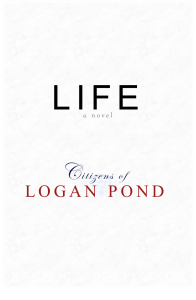 I think the most powerful question a writer can ask is “What if?” Those two little words are the reason I wrote CITIZENS OF LOGAN POND.
I think the most powerful question a writer can ask is “What if?” Those two little words are the reason I wrote CITIZENS OF LOGAN POND.
What if the end of America as we know it isn’t caused from some massive world war? What if it’s caused by the collapse of the economy? What if our technologically spoiled civilization suddenly has to live without running water, electricity, and even a basic grocery store? What if the government wants to help people and prevent mass starvation, but in reality, they only make things worse? What would that do to a small community of 36 neighbors? How would I survive if I didn’t have a dime to my name? (Okay, now I’m looking at a sleepless night ahead of me.)
I’m thrilled that Crescent Moon Press will be publishing this new trilogy. They’ve been so enthusiastic about the characters and story, it’s been awesome. I’m not sure yet when it will be published, but I’m starting round one of edits in the near future.
(Congratulations! I’ll have to keep an eye out for it.)
ME: How would you describe your writing process and what part does music play in it, if any? (I must have a picture of you at the piano.)
REBECCA: Hmmm. My writing process is constantly evolving. As I mentioned, I never planned to write SADIE. It just kinda happened. Since then, I’ve learned a lot about writing.
Now, I usually let a story play out in my mind for a while before I write anything down. I’m a daydreamer, so I start there, much to the chagrin of my family.
“Mom? Hello?”
Once I feel I’m onto something, I start to plot and outline. I use a couple of outlining methods, but I really like Blake Snyder’s beat sheet method. I also do some intense character sketching to figure out motivations, fears, strengths and weaknesses for the major characters.
From there, I start writing. First drafts are hard for me. Ironic, I know, considering I wrote the first draft of SADIE in three weeks. But I’d much prefer to edit and refine now. Still, I’ve learned to push through the first draft and allow myself to be dull and boring the first time through so I can get to the fun, refining process.
(I think most writers feel that way. I’ll bet your father does, too. And since you didn’t mention music, I guess it doesn’t play a role, but here’s a picture anyway.)
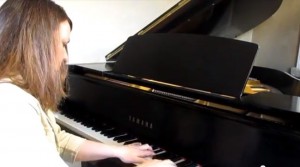 (Rebecca at the piano)
(Rebecca at the piano)
ME: Finally, I’d love a peek at the place where you do most of your writing. Please describe it in Guillermo’s voice, as if he’s come there looking for Sadie. (And we must have a photo.)
REBECCA: In Guillermo’s voice? Oh, man. Let’s see . . .
She sat at her desk, unaware. Her back was to the room, trusting her surroundings.
I smiled. I loved this about her.
She worked from two screens, and her eyes darted back and forth, mind racing and wonderfully preoccupied. Several books were strewn about, and papers filled every inch of work space. Homework assignments. Bills. Even a random screwdriver. What was the purpose in that?
I found the answer to my own question, and my smile grew. The screwdriver was long and sharp. Perfecto!
I crept closer.
Children climbed on and off her lap, causing more typos than she could keep up with. She was distracted. Always distracted. And oh, so very trusting.
Okay. I have to stop now because I’m freaking myself out. (What? No. It was just getting good! You can’t leave us hanging there.) Anyone could sneak up to me when I write because I’m so focused. (That’s why I write with my back to a wall…and a window that doesn’t open.) Thank you so much for that little writing exercise. (Picture me turning my laptop around to face the room.)
I’m seriously tempted to clean up my workspace before snapping a photo, but I won’t. Welcome to my frazzled brain. In my defense, my computer files are perfectly organized and tidy. Sort of.
 (And there you have it…the scene of Guillermo’s almost crime)
(And there you have it…the scene of Guillermo’s almost crime)
You can learn more about Rebecca’s writing or watch the trailer for SADIE (and even listen to some of her musical compositions) by checking out her website and blog.
But don’t forget to come back here next Wednesday when I’ll be interviewing fantasy author, Karen Hoover.

Originally posted 2013-07-10 06:00:18.
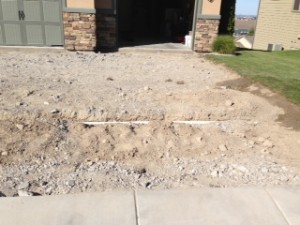
 So before the new driveway can be poured, a trench needs to be dug and a new pipe fitted to lie more deeply under the ground.
So before the new driveway can be poured, a trench needs to be dug and a new pipe fitted to lie more deeply under the ground.

